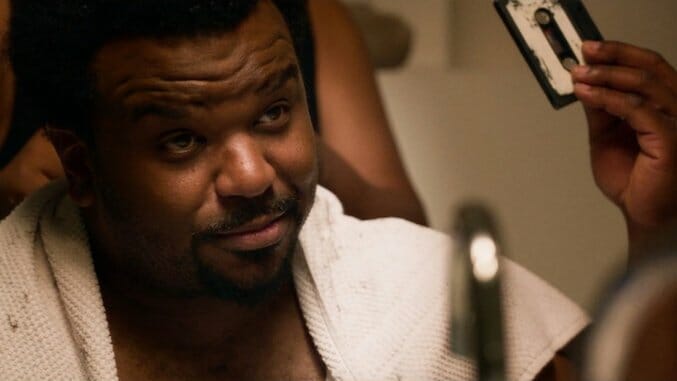Leading by Example
Craig Robinson talks the parent-child dynamic at the heart of Morris from America

In Chad Hartigan’s Morris from America, Craig Robinson plays Curtis, a soccer coach and American expat living in the German city of Heidelberg with his son, 13-year-old Morris, who aspires to rap stardom in a country where people do not listen to EDM so much as they live it. As teenagers tend to do when they feel isolated and unwanted, Morris acts out, kicking lurid rhymes in a talent show hosted by a local youth center, skipping town to tour with his crush and her slick DJ boyfriend, staying out at all hours and making his dad sick with anxiety that would be cured by a single text. Morris thinks he’s alone in his loneliness without catching on to the obvious: Curtis knows exactly how he feels, and perhaps doubly by virtue of his widower status.
Robinson is known best for comedy roles, from The Office to films with paid passage on the Judd Apatow train (Pineapple Express, Knocked Up), to collaborations with fellow Apatow vets (This is the End), and the Hot Tub Time Machine movies. So think of 2016 as the year when mainstream audiences get to see Robinson from new angles, not just in theaters, but on USA’s Mr. Robot, where he plays a Silk Road-level purveyor of online black marketing. Robinson has branched out his identity as a comic actor in recent years, of course—see 2014’s Get On Up—but Mr. Robot, and especially Morris from America, both let him flex actorly muscles that even his most devoted followers probably didn’t know he possessed.
Paste spoke with Robinson about Hartigan’s film, plus his role on Mr. Robot, and the inseparable link between comedy and drama, how boredom in adulthood really isn’t that bad, being a friend versus being a parent to a child, and yearning for layered roles as an actor.
Paste: I gotta start off just by saying, grounding a kid for not respecting Jeru the Damaja? That’s my kind of father right there.
Craig Robinson: [laughs] Right on. Yeah, man, he got grounded because he likes terrible music.
I think it speaks to, you know, once you get to know that character a little bit more, you see that Morris wants to be a rapper, so Curtis is showing him that this is what it’s really about. It’s like, “Hey man, you gotta get on the right bus.”
Paste: Yeah. It’s all part of making sure that Morris is raised right, you know? He’s gotta respect the greats.
Robinson: Exactly!
Paste: I like that rap is such an important element here. It represents common ground for Curtis and for Morris. It’s how they relate. Would you say that’s part of their intimate bond as father and son?
Robinson: Absolutely. I think he supports Morris in his endeavor to be a rapper. You know the scene where he gets upset with him because of his lyrics? Morris thinks it’s because they’re explicit, but no, it’s because you’re not saying what’s real. You’re not saying what’s real to you.
Paste: Yeah. At the end, Curtis talks about having a unique perspective, too, which I thought was really important to the whole movie. If this movie is all about honesty, and talking about what you know, and having this unique perspective, about coming of age and the lonesome adulthood Curtis is going through, I’m curious what you brought from your life, from your personal perspective, into playing Curtis, and into playing Morris’ dad.
Robinson: First of all, he’s my parents. They had a good cop, bad cop kind of thing, and he’s kind of drawing an impossible line between friendship and fatherhood. One of the things I recall my father actually saying was, “I’m his father, not his friend,” you know, when I was younger. That really spoke to me in terms of this role, because it was like, okay: You are the authoritarian, but your wife has died, so his mother’s dead, you have him in this foreign land, and you know he’s got to be out there. You don’t have all the time in the world to be with him, and you have to guide him. So there are all these things that Curtis knows are coming at his son, and Curtis has gotta be there for him. So, you know, I saw it as how my father would be the bad cop, and my mother would be the good cop, and that’s what I brought to it.
-

-

-

-

-

-

-

-

-

-

-

-

-

-

-

-

-

-

-

-

-

-

-

-

-

-

-

-

-

-

-

-

-

-

-

-

-

-

-

-








































